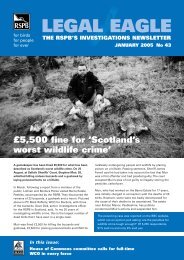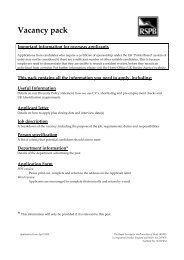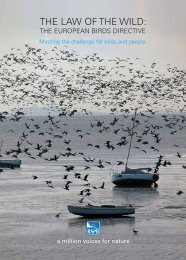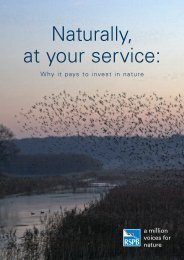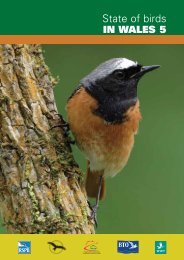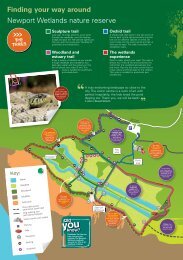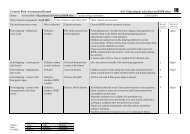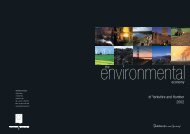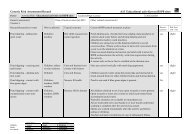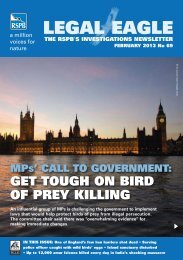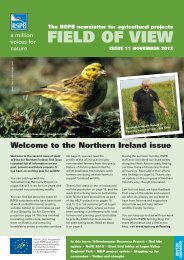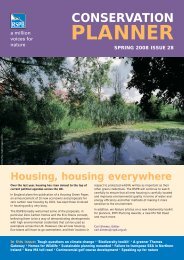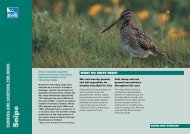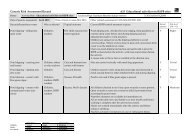State of Nature report - RSPB
State of Nature report - RSPB
State of Nature report - RSPB
Create successful ePaper yourself
Turn your PDF publications into a flip-book with our unique Google optimized e-Paper software.
URBAN<br />
<br />
<br />
<br />
With increasing development in cities,<br />
space for nature is under pressure.<br />
One solution is to create living<br />
ro<strong>of</strong>s. These consist <strong>of</strong> a waterpro<strong>of</strong><br />
membrane topped with a growing<br />
medium. Vegetation is then either<br />
planted or allowed to colonise naturally,<br />
producing patches <strong>of</strong> open habitat.<br />
Not only can living ro<strong>of</strong>s help a range<br />
<strong>of</strong> wildlife 13 , they also have benefits<br />
for ecosystem services such as water<br />
management, energy efficiency and<br />
pollution control. An estimated<br />
26,000 hectares <strong>of</strong> green ro<strong>of</strong>s<br />
could be created in London, an area<br />
equivalent to 28 times the size <strong>of</strong><br />
Richmond Park 14 .<br />
<br />
<br />
<br />
<br />
<br />
<br />
Some unexpected species can flourish<br />
in urban habitats. Peregrines now<br />
breed in every UK county, using<br />
building ledges as nest sites in<br />
many cities. This <strong>of</strong>fers people an<br />
unprecedented opportunity to see<br />
one <strong>of</strong> our most impressive predators.<br />
ontact with nature has many<br />
proven physical and mental<br />
benefits. Since more that 80%<br />
<strong>of</strong> the UK’s population live in urban<br />
areas, it is essential that people living<br />
there are provided with sufficient<br />
opportunities to experience nature –<br />
it may be the only chance they get.<br />
One estimate suggests that access to<br />
quality green space would save the NHS<br />
£2.1 billion pounds annually, because<br />
<strong>of</strong> the health benefits it provides 11 .<br />
It is clear that people need nature,<br />
but the reverse is also true – we need<br />
to inspire the next generation <strong>of</strong><br />
conservationists to tackle the ongoing<br />
problems faced by wildlife. The only way<br />
to do this is to help people experience,<br />
explore and understand the natural<br />
world, because people won’t protect<br />
what they don’t know and love.<br />
Worryingly, today’s children have less<br />
contact with nature than ever before.<br />
The loss <strong>of</strong> urban green spaces, coupled<br />
with cultural changes and the rise <strong>of</strong><br />
technology, means that many children<br />
rarely play outside. As a result, they<br />
are better at identifying Pokémon<br />
characters than common wildlife 12 .<br />
Even the most unlikely urban green<br />
spaces can provide encounters with<br />
fascinating wildlife, such as the striking<br />
lime hawkmoth caterpillar. Bearing a<br />
blue horn, it can be found wandering<br />
urban pavements in search <strong>of</strong> a suitable<br />
place to hide and pupate, eventually<br />
emerging as a beautifully-patterned<br />
moth. It is chance encounters with<br />
such creatures that can spark a<br />
lifetime’s enthusiasm for nature.<br />
Some rarities can survive in the most<br />
unlikely places. For example, one <strong>of</strong><br />
the few remaining sites where the<br />
field wormwood can be found is on an<br />
industrial estate in Brandon, Norfolk.<br />
A few miles away, three rare speedwells<br />
grow side-by-side on a garden bank.<br />
Isleworth Ait, an island nature reserve<br />
in the Thames, managed by London<br />
Wildlife Trust, supports populations<br />
<strong>of</strong> the two-lipped door snail and the<br />
German hairy snail, both amongst<br />
our rarest molluscs.<br />
56 STATE OF NATURE 2013




